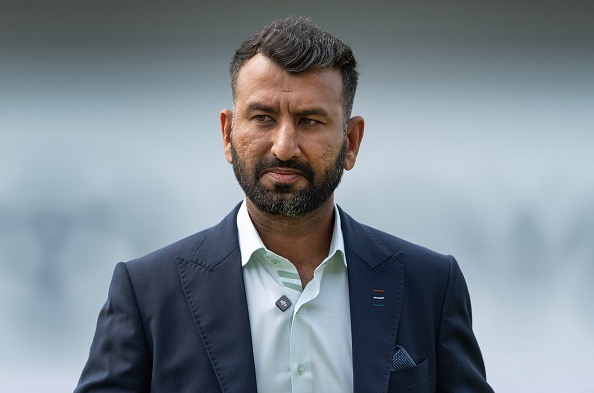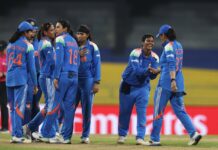
Formidable batsman Cheteshwar Pujara is happy to have said goodbye to his illustrious Test career, but he wouldn’t mind taking on a coaching position or working at the BCCI’s Centre of Excellence in the future.
Days after declaring his retirement from all forms of cricket, Pujara spoke to PTI, stressing the value of traditional Test match batting while also offering a glimpse into his future ambitions.
He also reflected on his incredible 103-Test career, which saw him score over 7,000 runs, his series-winning exploits in Australia, and the contributions of his late mother and father.
“I’ve enjoyed the broadcasting work for sure. So, I’ll definitely continue doing that. When it comes to coaching or any work at the NCA (Centre of Excellence), I’ll be open to it,” Pujara said.
“I haven’t genuinely thought about it. Whenever there is any opportunity which arises, I’ll try and take a call then…I’ve mentioned this earlier also that I would like to stay attached to the game.
“So, in whatever manner I can contribute to Indian cricket, I’ll be more than happy to do so,” he added.
Pujara quit the game without any regrets, having not considered retiring from the ground.
However, he admitted that, despite the continued importance of traditional hitters, Test cricket is hardly played in the traditional manner these days.
When a young Indian team surpassed expectations to draw the five-match series, Pujara was providing commentary in the United Kingdom. Throughout the series, players like Rishabh Pant and Ben Duckett displayed unrestrained aggression, while KL Rahul, who was at the top of the order, also gave off an air of composure.
That being said, the traditional style of batting in Test matches is becoming extinct. Is it sad for someone like Pujara? “I don’t think I am sad. I still feel that even in the current era, there is scope for a classical Test match player. But times have changed. One needs to move on with the time,” he said.
“And if I had to tell anything to a young player, I would definitely say that you should choose playing all three formats of this game because we are seeing more white ball cricket now,” he added.
He claims that this is because players are being selected for the Test team based on their IPL or ODI performances.
“So when you perform well in white ball cricket, you are automatically given a chance to represent the Indian Test team. And that’s why their game is on the aggressive side,” he explained.
He also pointed to examples like Abhimanyu Easwaran and Karun Nair, who earned their opportunities through strong Ranji Trophy performances.
“So there is still a scope for players who are doing well in Ranji Trophy and still getting picked in the Test squad,” said Pujara, who was India’s rock at number three for more than a decade.
KL Rahul was one of the most impressive batters in the England series. At the top of the order, he played the traditional method and achieved the intended outcome. Rahul’s strategy as an opener gave Pujara hope for traditional Test batting, which entails exhausting the bowlers as he did so masterfully.
“He is one of the best Test batters we have currently in the squad…he is one of the most technically correct players in the Indian team. Also, it is good that he is opening the innings which is also setting the foundation for the entire team.
“We also saw that he performed well in Australia and then his form dipped a bit but now he is working on it…he is carrying on with his form, converting his starts into big scores which is a positive thing to see.
“Hope he carries on like that not just in Test cricket but in other formats as well,” said Pujara.
Despite playing for India for the last time in 2023, Pujara continued to play for Saurashtra in both county and Ranji Trophy matches. While commentating on the game in England, he had plans to play in another domestic season, but he returned to Rajkot and decided to move on.
“Slowly it is sinking in. But at the same time, I’m really overwhelmed with all the love and support provided by all the family members, friends and my teammates, the coaches I’ve worked with, the cricket fans,” he said.
Was Pujara motivated to bid the game farewell by the retirements of fellow veterans like Rohit Sharma and Virat Kohli? “When I was in the UK, I was actually looking forward to the season. But once I came back home, I was settling in. And when I was about to start my preparation for the Ranji Trophy, I wanted to speak to my family, to my friends, some of my colleagues. What are their thoughts on me playing this season.
“Because I knew that if I played another season, I would be holding a spot in the team and I didn’t want to do that. And I wasn’t 100 per cent sure that I wanted to carry on playing the entire season.
“So I thought that it was the best time for me to move on and provide an opportunity to the younger player who can be part of the Saurashtra team.”
As he endured the pressure from the other end, Pujara, who faced 16217 balls during his Test career, let players like Kohli play their natural game.
Regarding Kohli’s statement that he made his life easier at number four, Pujara remarked: “It’s a nice compliment from Virat. He’s a great player. And if he’s saying that I’ve made his life easier, I’m really proud because if you’re a top-order batsman, your job is to ensure that the batters who bat at number 4, 5, 6, you make their life easier.”
Since Pujara’s departure, India has been unable to find a reliable number three. Does he think anyone on the current team will eventually fill that difficult role?
“Well, it’s very hard to say at this stage. But Indian team has a lot of young, talented players. Someone like Sai Sudharshan has started this journey well. We saw some potential in his batting.
“At the same time, Karun Nair also scored a 50, though he was batting at number 5. Both Sai and Karun have shown a lot of potential going forward.”
Pujara, who is known for his cool head and friendly disposition, became a little teary-eyed when discussing his late mother, Reena Pujara, and father, Arvind Pujara, who was also his coach and a former first-class player.
“It was an emotional moment for him as well. He also was an inspiration for me because his commitment towards cricket was excellent and I’ve learnt a lot from him. But I also would like to thank my mom.
“I lost my mom when I was 17 because of cancer, but she taught me a lot of things. She taught me to be a good human being. My wife Pooja as well, she has written a book where she writes that it takes a village for a person to be a successful cricketer,” he said.
Pujara gave it his all in Australia, helping India win back-to-back series there. He scored three hundreds in the first one and endured numerous body hits in the second, which prevented Australia from winning in their own country.
Asked to pick his favourite, Pujara said: “It’s hard to pick one series because both have been incredible ones. I was able to contribute in both the series in different ways.
“Maybe number of runs were more in 2018. But the kind of team we were playing with in 2021, despite having so many difficulties, we were playing through COVID times, there were a lot of restrictions, there were so many changes within the team for various reasons.
“…2018 was the first time when India won the Test series on Australian soil. So that is one of the proudest moments for me individually,” he reflected.
“And the next one in 2020 and 2021 was an entirely different series where things were not going India’s way and then we still to manage to win Test matches and win a Test series over there was a fantastic achievement,” said Pujara.
England was the hardest country for him to play in, even if Australia was his happy hunting ground.
“If I had to pick one country where things were really challenging, I would go with English conditions.”
When Pujara made his Test debut, players like Rahul Dravid and Sachin Tendulkar were present. He thrived in foreign conditions because of the invaluable chats he had with them early in his career.
“…when you have so many senior players within the dressing room, you get to interact with the…Also, I had asked them questions about how to be successful in overseas conditions.
“I have spoken to each and every one of them individually and I have got great feedback, great inputs about how they prepared, what they saw in my game and what I had to work on going forward.”









